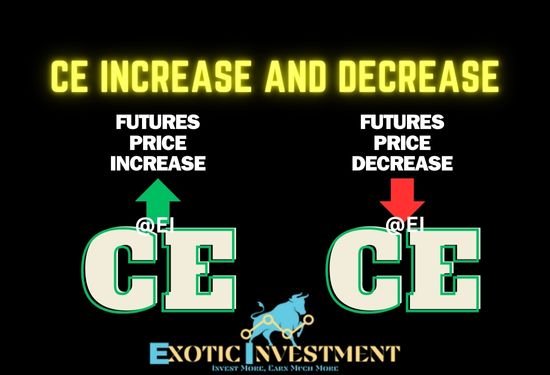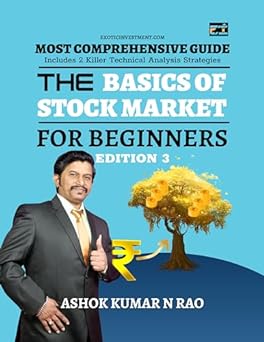Hey there, fellow traders! Let’s roll our dice towards CE or Call European as its full form indicates in options trading.
If you are a total beginner to Stock Markets, you’ve to read my book The Basics of Stock Market for Beginners before considering options trading.
Ever heard of a “call” in options trading? No? It’s not your grandma checking in during market hours.
Imagine this: You’re at a party and see a hot maal. You wanna dance, but you’re not sure if it’s into you.
That’s when you make a bold Call. Not to crush your feelings but in the options market.
It’s like asking, “Hey, can I buy this stock from you at a specific price later?” Smooth, right?
It’s the options version of sliding into the market’s DMs.
So, next time someone says, “I made a call,” just remember, it’s not about dinner plans, it’s about securing a date with a stock.
MUST READ: Can Futures And Options Trading In India Be A Full-time Occupation?
What Is CE In Stock Market?
As I already mentioned, India did not come up with the Atma Nirbhar Bharath’s slogan for options trading.
We brought the concept from the European/British Raj!!! Hence the CE full form in share market is Call European!
In the context of options trading in India, “CE” commonly refers to “Call European.”
A European Call option is a financial contract that gives the holder in this context You, the right (without the obligation) to buy an underlying asset at a predetermined price (strike price) on or before the expiration date.
The “European” in the name shows that this option can only be exercised (as the fancy name in the stock market is called), on the expiration date, unlike “American” options that allow the exercise of power at any time before, or, on the date of expiry.
If you are so novice to not know what an options expiry is you need to read these Options Trading Basics first. Then read a bit more in-depth in Options Trading Basics part 2.
For Ex.) if you hold a European Call option of a stock with a strike price of ₹1,500, you have the right to purchase that stock at ₹1,500 per share on the expiry date.
However, it’s important to know that this right can only be executed on the expiry date.
Call options are often used for bullish/positive positions, enabling investors to capitalize on potential increases in the underlying asset’s/stocks/index price.
MUST READ BOOK: The Basics of Stock Market for Beginners
How does CE in Stock market Work?
Let’s say, your CE is just like your early love/infatuation life.
The more deeply you get involved in your love life, the more your involvement grows.
More gifts you buy and more… and more… you get to flex your hand and shlongs.
This more and more is called Proportionality.
If this happens then that growth in value is Directly Proportional.
Let me explain now, how this analogy holds good for CE in Stock Markets.
The more the futures price of stock/index grows more your CE option grows.
It’s like a seedling growth cycle. The more compost you feed to the seedling more it grows in strength and more its growth.
So now to relate it or sum it up, when a stock/index grows, the CE grows in value.
MUST READ: Can Day Trading Make You Rich For an Exhilarated Excuse Free Life?
What factors influence the CE in Stock Market?
The Strike Price, Time Decay, Call/Put Ratio, and Delta are some of the factors that influence the CE in stock markets.
There is not just love or infatuation that gets you deeply involved in a relationship, in the same way, there are lots of other factors involved in influencing the price of CE in stock markets.
Although we’ve listed 4 factors, mind you this is not just it which is a fully compiled list.
So lemme sum it up by explaining how these 4 factors influence Call/CE in stock market.
1.) Strike Price:
The strike price is the level at which, traders gauge the stock/index to rise or fall within the time of the options expiry cycle.
You need to choose the correct strike price for success in buying/selling options.
In any options for stocks or indexes, there are multiple levels of strike prices above and below the spot price at any point in time as determined.
As the spot price increases or decreases in price, the deep out of options on the higher side or lower side gets out of trading purview and ceases to trade from the next working day.
Example of a strike price of Nifty:
Assume the Nifty spot price is 20000, the Nifty strike prices will be 20050, 20100, 20150, 20200,……21100.
On the lower side of the strike prices, you’ll find 19950, 19900, 19850,….18900
2.) Time Decay:
Wow.. You must know if you are buying an option, either a CE or a PE, time decay is a killer!
Do you know what ways time decay will reduce options’ price? Check it out now:
- If the stock/index moves slowly the option will decay in price.
- If the stock moves up 100 points and reduces by 50 points, even then the price you bought it at can be higher and the option can dip down more!
- If the stock Is moving sideways the options will 100% reduce in premiums!
Basically, when you buy an option contract, time decay is acting against you from the moment you buy it!
3.) Call/Put Ratio:
Big institutions buy CE or PE to hedge against their positions.
Meaning when a stock/index goes in reverse of their positions, options buying will reduce their downside risks.
So institutions obviously should gulp At the Money or slightly out-of-money options in bulk to reduce their risks.
In such cases CE/PE ratio of a stock/index increases or decreases depending on the way it is moving.
So this will either decay the options premium more or increase the price in spite of favorable conditions.
4.) Delta:
Delta is the change in the option’s price or premium due to the change in the Underlying futures price.
Example: If the delta is 0.4 of a particular strike price option and the futures price of a stock goes up by ₹100, then the stock option goes up by ₹4.
So as per the delta value, the options premium reduces.
On the day of expiry, theta decay is the highest and all out-of-the-money options delta will reduce to 0.
Because of this value of the option also would reduce to 0.
If you are still wondering about trading or investing in stock markets, you gotta get your fundamentals about the stock market right.
Read my book The Basics of Stock Market for Beginners to get a clear understanding of stock markets and options trading.
Please let me know your thoughts about today’s Facebook Ads Adsense Arbitrage post in the COMMENTS below.
Follow me on Facebook and Youtube.
Happy Trading and Happy Money Making!


